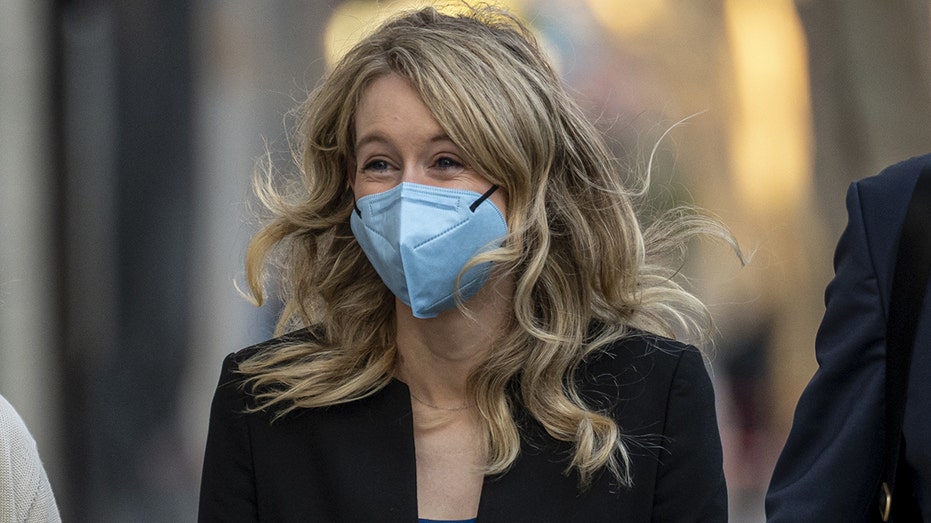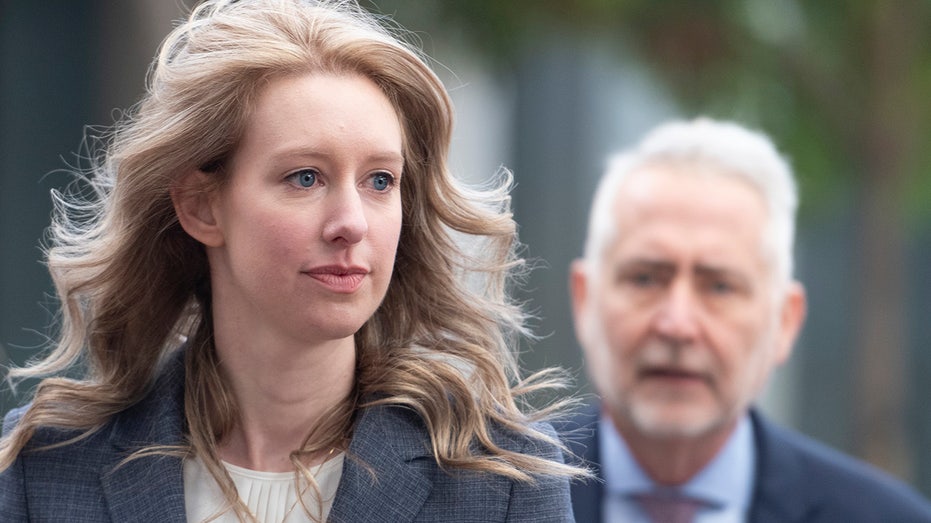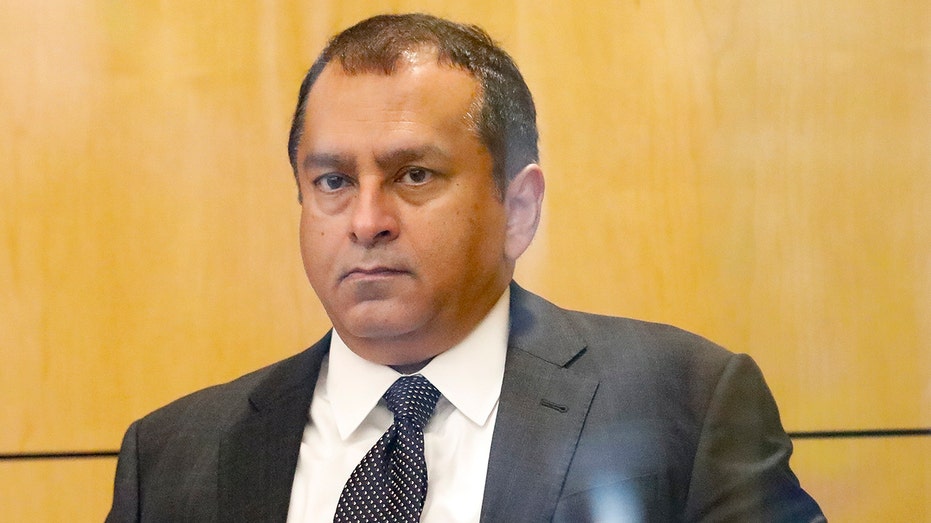Elizabeth Holmes’s testimony: Moments that might influence jurors
Theranos founder has testified about the control she had at the blood-testing startup, and the torment that she endured
Elizabeth Holmes putting on 'very believable act': Lashinsky
FOX contributor Adam Lashinsky comments on the unravelling of the Theranos trial.
Elizabeth Holmes’s surprise turn on the witness stand in her criminal-fraud trial has given jurors a close look at the control she held over her blood-testing startup Theranos Inc., and at the alleged torment she endured in her personal life at the same time.
Her six days of testimony have included moments that helped and hurt her case, trial observers say.
Through it all, she has told her story in the clear and confident voice that followers of Theranos will recall from the company’s heyday. Ms. Holmes rarely flinched during questioning by her lawyer or the government, responding succinctly and keeping eye contact with her questioner, only occasionally speaking directly to the jury. She has smiled frequently, offered a few small laughs and gotten teary while testifying about her relationship with her alleged abuser.
Her signature black turtlenecks—ubiquitous in public events and media appearances during Theranos’s rise—have been replaced by tailored business dresses and blazers in deep blues, greens and black.

Elizabeth Holmes, founder of Theranos Inc., arrives at federal court in San Jose, California, U.S., on Tuesday, Nov. 30, 2021. Photographer: David Paul Morris/Bloomberg via Getty Images (Photographer: David Paul Morris/Bloomberg via Getty Images / Getty Images)
THERANOS FOUNDER ELIZABETH HOLMES TESTIFIES THAT BALWANI BERATED, ABUSED HER
"She’s a clearly articulate witness and clearly has a history of being incredibly persuasive," said Ellen Kreitzberg, a law professor at Santa Clara University who has followed the proceeding but isn’t involved in the case.
The persona of the confident yet traumatized chief executive could create reasonable doubt in the minds of jurors, legal observers following the trial say, and muddy the evidence prosecutors put forward over 11 weeks to prove she intended to defraud investors and patients about the reach of Theranos’s technology.
Prosecutors charging her with 11 counts of fraud questioned Ms. Holmes again on Tuesday, followed by another round of questions from her lawyer. Here are highlights of her testimony as the trial nears its conclusion.
The pitch
Ms. Holmes took listeners back to the earliest days of Theranos’s inception. Speaking with the conviction of a founder pitching an investor, Ms. Holmes discussed her goal of increasing access to healthcare, saying, "People have a fundamental right to their own health information."
She testified that, "we wanted to help people who were scared of needles," including children, elderly people, cancer patients and women undergoing fertility treatments, who she heard sometimes had to wear long-sleeved shirts to cover up bruises from frequent blood draws.
In one of her first answers from the stand, she agreed with her lawyer that she believed Theranos had developed technology capable of running any blood test. She repeatedly said throughout testimony that reports she got from subordinates led her to believe elements of the company’s technology were working.
Former Theranos employees, including a chemist and a lab director, have testified that they tried to report problems with the blood-testing startup’s technology and were rebuffed or ignored.
Forged documents
Ms. Holmes took aim at what lawyers following the trial have deemed the prosecution’s strongest evidence: Theranos documents that were altered to include the names and logos of pharmaceutical companies, including Pfizer Inc., suggesting the companies had validated Theranos’s technology.
Ms. Holmes admitted to doctoring the reports but said it wasn’t done maliciously.
"This work was done in partnership with those companies and I was trying to convey that," she said. She said the results Theranos wrote up from the study with Pfizer were particularly exciting, and she wanted Walgreens Boots Alliance Inc. and other investors to know about them.
ELIZABETH HOLMES CLAPS BACK AGAINST SERIOUS ALLEGATIONS ABOUT THERANOS
"The devices worked and I thought the data was really good and I wanted to share it with them," she testified.
Prosecutors later showed that she clearly violated contract agreements when she added the logos and that she deleted an unfavorable conclusion in one report.
"I wish I had done it differently," she said, in what would become a refrain throughout her testimony.
The pivot to commercial blood analyzers
Ms. Holmes said Theranos started using commercial blood analyzers because the company couldn’t handle processing a high volume of patient blood samples on its own proprietary devices, not because the company was trying to mislead anyone.
The company originally conceived of its finger-prick machines being placed directly in pharmacies, she testified, but the plans changed when business partner Walgreens requested that Theranos place all its devices into a central lab instead.

Elizabeth Holmes, founder and former CEO of Theranos, arrives for motion hearing on Monday, November 4, 2019, at the U.S. District Court House inside Robert F. Peckham Federal Building in San Jose, California. (Photo by Yichuan Cao/NurPhoto via Getty (Photo by Yichuan Cao/NurPhoto via Getty Images / Getty Images)
It became impractical to test hundreds of samples on its proprietary devices, Ms. Holmes said, because each machine could run only one sample at a time, so Theranos bought commercial analyzers and modified them to work with the small samples of blood it collected.
They didn’t tell anyone, including Walgreens, she said, because it was Theranos’s intellectual property. She said the workaround was a protected trade secret, in what became another common refrain of her testimony.
Theranos falsely claimed it could run more than 200 tests on a small amount of blood from a finger prick using its proprietary device. In 2015, at a conference days after The Wall Street Journal first reported on Theranos’s problems with its technology, Ms. Holmes insisted: "We have never used commercially available lab equipment for finger-stick based tests."
Remorse
Ms. Holmes expressed regret for how Theranos handled complaints from lab employees, a moment that made her appear human, legal observers said, but also allowed the government to show the lengths to which the company went to undermine two of its young scientists whose concerns were later validated by regulators.
Jurors heard how Theranos hired private investigators to tail the scientists and sent them menacing legal threats to keep them from talking to journalists and regulators about problems at the lab, citing trade secrets.
THERANOS TOOK SHORTCUTS AS BLOOD-TESTING TECHNOLOGY FAILED, PROSECUTORS SAY
Ultimately, Ms. Holmes testified, she tried—unsuccessfully—to quash the Journal’s reporting by appealing to Theranos investor Rupert Murdoch, the executive chairman of News Corp, which owns the Journal’s publisher.
"The way we handled The Wall Street Journal process was a disaster," she testified.
Both of the targeted former employees later said they were sources for the Journal’s reporting.
Abuse allegations
Most strikingly during her time on the stand, Ms. Holmes accused her former boyfriend and top deputy at Theranos, Ramesh "Sunny" Balwani, of emotional and sexual abuse. She described a relationship in which she spent more than a decade trying to live up to his exacting standards at the expense of her friends, family and personal agency.

SAN JOSE, CA - JULY 17: Former Theranos COO Ramesh Balwani appears in federal court for a status hearing on July 17, 2019 in San Jose, California. (Photo by Kimberly White/Getty Images) (Photo by Kimberly White/Getty Images / Getty Images)
A lawyer for Mr. Balwani has denied all allegations of wrongdoing and called the abuse allegations by Ms. Holmes "devastating personally to him."
The government tried to show the relationship with Mr. Balwani was at times loving, asking Ms. Holmes to read aloud some of their adoring text messages.
Inflated projections
In her final day being cross-examined by prosecutors, Ms. Holmes appeared to lose her usual composure briefly during an exchange about Theranos’s financial projections.
Assistant U.S. Attorney Robert Leach brought Ms. Holmes’s attention to a document shown to an investor that projected revenue of almost $1 billion in 2015. The same document showed projected revenue from pharmaceutical-company contracts that year of $40 million.
Mr. Leach pointed out that Theranos didn’t receive any revenue from pharma companies in 2014, and asked how it would be possible to get to $40 million from zero in a year.
Ms. Holmes paused, stuttered slightly, and finally answered that it could have been expected revenue from a GlaxoSmithKline contract signed years earlier.
Mr. Leach then reminded Ms. Holmes of testimony from Theranos’s former comptroller saying no money came in from GSK from 2007 to 2013. In a dramatic moment, he asked about each year separately, with Ms. Holmes affirming each time that no, Theranos had no GSK revenue that year.
Blame game
Ms. Holmes has cast blame on a long list of people during her time on the stand: Mr. Balwani, lab directors, the company’s board and her marketing agency.
Complicating that narrative, she also testified repeatedly that she—not Mr. Balwani or others—had power over what she told investors, business partners, board members and journalists.
Lawyers observing the trial say the testimony is likely to weigh heavily on jurors, who can only vote guilty if they have no doubts that she intended to defraud.
READ MORE ON FOX BUSINESS BY CLICKING HERE
"I think some people could find that she’s overworked, trying to do her best to keep the company together, and that she made the best decisions she could at the time," said Michele Hagan, a lawyer and trial consultant who has attended much of the trial but isn’t connected to the case. "Maybe that’s enough for some people."




















